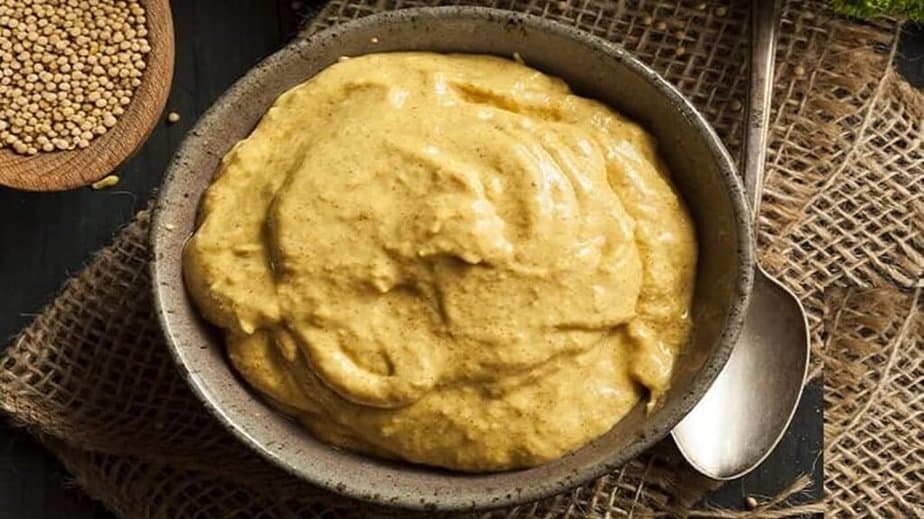How spicy is Dijon mustard? What mustards are milder or spicier than this traditional mustard of France? Exactly, that’s what you are going to see in this article.
Some love to enjoy spicy foods but many others hate them. For most people, the choice of a mustard type has a lot to do with its level of spiciness.
Carving for spicy foods is an irresistible compulsion for some. Studies suggest that eating spicy food induces the pituitary gland and hypothalamus specifically to release endorphins, a biological chemical that elevates moods and feelings of pleasure.
Mustards are one of the oldest known condiments, dating back to early Roman culinary habits. Today, there are several types of mustards, among them, Dijon and yellow mustards are widely popular.
Making Dijon Mustard
It’s fairly simple to make Dijon-style mustard. It involves the simple process of grinding up brown or black mustard seeds and pureeing along with white wine/ a mix of wine vinegar, and salt. Usually, it’s best to soak the mustard seeds in wine or vinegar for a minimum of four hours up to 4 days maximum. Also, refrigerate the finished mustard for 24 hours before serving.
Note, you’ll find many variations of Dijon mustards with additional or optional ingredients like egg yolks, sugar, garlic, modified food starch, or onions. The spiciness of Dijon will depend on the ingredients used in it.
Some prefer to make a milder version of Dijon-style mustard with a mix of brown and yellow mustard seeds. Brown or black mustard seeds are spicy and hotter than white or yellow mustard seeds.
Is Dijon Mustard Spicy?
Dijon mustard is moderately spicy with tangy, sharp, and strong flavors. The authentic version of this mustard made with verjuice used to be tangier than the ones made with white wine or white wine vinegar.
However, the commercially sold mustard from brands like Grey Poupon or Maille uses ingredients with a low acidity level and allows the potency of the mustard seeds to overwhelm other ingredients.
The spiciness of Dijon mustard varies according to the ingredients and type of mustard seeds used. The brown mustard seeds locally sourced from the Burgundy region of east-central France have a distinctive flavor with a good bit of spiciness. Brown mustard seeds possess a sharp heat flavor that rates as a 2 or 3 on a heat scale from 1 to 10.
Mustards made with strong vinegar through an acidic reaction reduce the intense heat of mustard seeds. Authentic Dijon mustard, invented by a mustard maker from Dijon by the name of Jean Naigeon, used verjuice, a less acidic liquid, which gave Dijon mustard a robust profile, intensified heat, and more pungent flavor.
Variations In Heat Levels of Dijon Mustard
The heat and pungency of mustard come from the enzymes that convert into mustard oil once the seed is broken. Crushed raw mustard seeds can produce a nasal-clearing burn. But the crushed mustard seeds when mixed with liquids like water, wine, vinegar, or verjuice the heat of these seeds stabilizes in varying degrees. Dijon mustard with white wine or white wine vinegar restricts the heat to a moderate level; turns out to be a flavorful condiment right enough to give a pleasant mustard flavor to burgers, hot dogs, sandwiches, or others.
Depending on the and quantity and number of additional ingredients like garlic, onion, or sugar used in the mustard can increase or decrease the heat level of the mustard. Similarly, when black mustard seeds are used instead of brown mustard seeds, it produces a slightly stronger flavor. Some brands sell a milder version of Dijon which has a mixture of brown and yellow mustards as ingredients.
A point to be noted, bottling, acidic reactions, and refrigeration lead to the gradual loss of the heat and pungency of mustard over time.
When you are buying Dijon mustard, always check the ingredients listed on the label thereby you can guess its pungency and heat levels.
RELATED: What is a good substitute for Dijon mustard?
Mustards Spicier Than Dijon
As the name suggests, spicy brown mustard is the hottest of the lot. It is made with brown mustard seeds soaked in very little vinegar than standard mustards. A combination of less acid and hotter seeds makes it more pungent than the rest.
Whole-grain mustard is made of mustard seeds that have been ground just enough to form a paste. It may or may not include an acidic ingredient like vinegar. The whole grain mustard made with black or brown mustard seeds is hotter than Dijon mustard.
Chinese hot mustard made with ground black or brown mustard seeds, water, and less vinegar render a mouth-scorching mustard potential. Especially, the homemade hot mustard can be way hotter than Dijon.
Beer or Spirit mustard, often used in American cooking, uses bear as the base liquid for mustard with a bit of vinegar. Having less acidity, beer mustard usually delivers heat more than Dijon.
Mustards Milder Than Dijon
On the mustard heat scale, yellow seeds are at the bottom. Yellow mustard made with yellow seeds is tangy and sweet with hardly any heat. Anyways, Dijon mustard and yellow mustard are two favorite mustards for most people.
Honey mustard, usually made by making a blend of honey and powdered mustard isn’t hot at all. It is mostly used for sweetening the sauces. Honey mustard retains some mustard complexity though most of its spicy edge is neutralized.
English mustard made with a mixture of yellow and brown mustard seeds and vinegar is comparatively milder than French mustard. German mustard, almost similar to the English mustard also has a mild flavor with a bit of sweetness.
Related articles:
- What’s a good replacement for black mustard seeds?
- Looking for a dry mustard substitute?
- What to do when I don’t have powdered mustard?
